Securing Funding For Sustainability Initiatives In Small Businesses

Table of Contents
Identifying Funding Opportunities for Sustainable Business Practices
Transitioning your small business to a more sustainable model requires financial resources. Fortunately, numerous funding opportunities exist specifically designed to support green business ventures. Let's explore some key avenues:
Exploring Grants and Subsidies
Governments at all levels—local, regional, and national—recognize the importance of environmental sustainability and often offer grants and subsidies to encourage eco-friendly business practices. These grants can cover a wide range of initiatives, from energy efficiency upgrades to renewable energy installations and waste reduction programs.
To find these opportunities, explore government websites dedicated to environmental programs and sustainability initiatives. Many organizations maintain comprehensive databases of grants, filtering options by industry, location, and project type.
- Types of Grants:
- Energy efficiency grants (e.g., for improving insulation, installing energy-efficient equipment)
- Renewable energy grants (e.g., for solar panel installation, wind turbine projects)
- Waste reduction grants (e.g., for implementing recycling programs, reducing packaging)
- Water conservation grants (e.g., for installing low-flow fixtures, implementing water-efficient irrigation systems)
Securing Green Loans and Lines of Credit
Several financial institutions offer green loans and lines of credit specifically designed for sustainable business investments. These loans often come with attractive interest rates and favorable repayment terms, making them an appealing option for small businesses. While the eligibility criteria may be stricter than traditional loans, the long-term benefits, including potential cost savings and enhanced brand reputation, often outweigh the initial hurdles.
- Types of Green Financing:
- Term loans for significant capital investments (e.g., renewable energy installations)
- Revolving lines of credit for ongoing operational expenses related to sustainability initiatives
- Equipment financing for purchasing energy-efficient machinery and tools
Attracting Impact Investors and ESG Funds
Impact investing and Environmental, Social, and Governance (ESG) investing are gaining momentum. These investors prioritize both financial returns and positive social and environmental impact. To attract these investors, you need to demonstrate a clear link between your sustainability initiatives and your business's financial performance. Showcase the environmental and social benefits of your projects, quantifying the positive impact wherever possible. A compelling narrative showcasing your commitment to sustainability and measurable results will significantly increase your chances of securing funding.
- Creating a Compelling Investor Pitch:
- Demonstrate a strong return on investment (ROI) for your sustainability projects.
- Clearly define and measure the environmental and social impact of your initiatives.
- Develop a robust sustainability plan that aligns with your overall business strategy.
- Highlight the long-term benefits, such as improved brand reputation, increased customer loyalty, and reduced operational costs.
Developing a Strong Funding Proposal for Sustainability Projects
A well-structured funding proposal is crucial for securing the necessary resources. It needs to clearly articulate your sustainability goals, demonstrate the financial viability of your project, and highlight the positive impact on your business and the environment.
Defining Clear Sustainability Goals and Metrics
Define SMART (Specific, Measurable, Achievable, Relevant, and Time-bound) sustainability goals. Quantify the environmental impact of your initiatives using clear metrics. For example, aim to reduce your carbon footprint by a specific percentage within a defined timeframe. This clarity showcases your commitment and allows potential funders to assess the effectiveness of your plan.
- Key Elements of a Strong Sustainability Plan:
- Baseline assessment of your current environmental impact
- Specific, measurable targets for reducing your environmental footprint
- Detailed implementation plan outlining the steps you'll take to achieve your goals
- Monitoring and evaluation system to track progress and make adjustments as needed
Creating a Compelling Business Case
Demonstrate the financial viability of your sustainability projects, showcasing both the short-term and long-term financial benefits. Highlight cost savings from improved energy efficiency, reduced waste, and increased resource productivity. Explain how your sustainability initiatives will enhance your brand reputation, attract environmentally conscious customers, and improve employee morale.
- Essential Components of a Compelling Business Plan:
- Executive summary highlighting the key aspects of your project
- Detailed market analysis demonstrating the demand for sustainable products and services
- Comprehensive financial projections demonstrating the ROI of your sustainability initiatives
Building Partnerships and Collaboration
Collaborating with other organizations, such as NGOs, research institutions, or industry associations, can significantly strengthen your funding proposal. Partnerships can provide valuable expertise, access to networks, and shared resources, enhancing the credibility and impact of your sustainability initiatives.
- Potential Partners for Sustainability Initiatives:
- Suppliers committed to sustainable practices
- Customers who value environmental responsibility
- Local communities invested in environmental protection
Conclusion
Securing funding for sustainability initiatives in small businesses requires a strategic approach. By exploring various funding options, developing a strong funding proposal, and building strategic partnerships, you can successfully secure the resources you need to embark on a greener, more sustainable, and ultimately more profitable business journey. Remember, investing in sustainability is not just an environmental imperative; it’s a smart business decision that can lead to significant long-term gains. Start securing funding for your sustainability initiatives today! Explore green business funding options now! Take the first step toward a more sustainable and profitable future by researching available grants and loans for sustainability projects.

Featured Posts
-
 De Soto Countys Statewide Broadband Leadership 100 Connected
May 19, 2025
De Soto Countys Statewide Broadband Leadership 100 Connected
May 19, 2025 -
 Primarias 2025 El Cne Recibe 18 Recursos De Nulidad
May 19, 2025
Primarias 2025 El Cne Recibe 18 Recursos De Nulidad
May 19, 2025 -
 Pedro Pascals The Last Of Us Season 2 Role Addressing Fan Theories
May 19, 2025
Pedro Pascals The Last Of Us Season 2 Role Addressing Fan Theories
May 19, 2025 -
 Prognose Passagiersaantallen Maastricht Airport Begin 2025
May 19, 2025
Prognose Passagiersaantallen Maastricht Airport Begin 2025
May 19, 2025 -
 Ofcom Regulation Royal Mails Plea For Change
May 19, 2025
Ofcom Regulation Royal Mails Plea For Change
May 19, 2025
